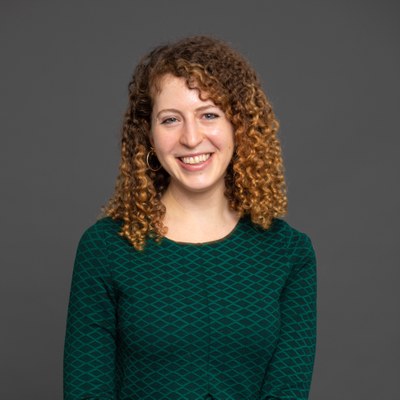Profile of Emily Frank
What does immigration mean for the welfare state? What are the hurdles asylum seekers face in claiming social benefits? And which factors influence a person’s experiences with bureaucracy?
These are the questions Emily Frank is pursuing in her doctoral research. Frank is a PhD candidate in the RTG Dynamics research group at Humboldt-Universität zu Berlin and the Hertie School, where she is researching refugees’ experiences with German bureaucracy.
Frank’s journey in the subject area began during her bachelor’s when she took her first sociology course, which she loved immediately. "To me it was always the most interesting topic, talking about society’s assumptions and norms and social stratification," she told me. Contributing to social change was also a big factor in her interest in the field — having an impact is at the heart of how she approaches her life and her work.
This desire to have an impact has manifested in a number of forms throughout her career, ultimately bringing her to her current position in the Dynamics research group. After finishing her BA in sociology at New York University, she decided to pursue direct service. She worked as a legal advocate at the Urban Justice Center in New York, where she helped low-income clients get access to social benefits and engaged with city government on issues surrounding language access policies. The latter experience ignited an interest in public policy for her. "This was a really interesting systemic issue and I’m really interested in more systemic fixes," she said. After finishing a Masters in Public Policy at the University of Wisconsin-Madison, she worked in scientific communication at the Max Planck Institute for Demographic Research before finally deciding to pursue her own research in a PhD.
Frank’s research interests have been influenced by each of these steps along the way, ultimately converging around the topics of asylum and the social welfare system. "The welfare state is conceptualized as providing benefits to people who are members of the society, and if we live in a society where people are always coming and leaving, what does that mean for public policies on social rights for immigrants?" she asks.
Her doctoral work looks at these questions using exploratory mixed methods, an approach that involves starting with a qualitative phase and using it to inform a later quantitative phase. In Frank’s case, this means starting with interviews with refugees with a variety of legal statuses and using those interviews to inform her work with survey data. The idea is to work from the ground up and to develop a theory from the data rather than using data to test a pre-existing theory.
Her dissertation will present these findings in three studies. The first study will address what is called administrative burden, which are the many costs associated with dealing with government agencies. That includes the challenges and hoops of figuring out which benefits you’re eligible for, filling out paperwork, and going to appointments. In her study Frank plans to introduce a new kind of cost, the transitional cost of going into a new system. Entering the bureaucratic system in a new country brings with it an additional set of hoops and hurdles, including language barriers and the process of getting qualifications recognized.
The second study looks at the particular psychological cost of a loss of agency, that is people’s sense that they have control over their lives. In the course of her interviews, Frank noticed systematic differences in the amount of agency people felt in their interactions with welfare agencies depending on their legal status. Those awaiting asylum or with a delay of deportation felt they had less control over their lives than those who had already been granted asylum or those who didn’t have to apply for it at all.
For the final study, Frank is working with a researcher at the Institut für Arbeitsmarkt- und Berufsforschung to look at data from the 2018 Socioeconomic Panel, in which the survey asked refugees about their experiences in bureaucratic offices. She’s interested in how a person’s legal status and their interactions with caseworkers affect their satisfaction with bureaucracy. Early results indicate that treatment from caseworkers and legal status both have an effect.
Frank would like to see these findings lead to changes in the system and ultimately to a more inclusive welfare state. "I would hope that my research has some positive impact on refugees’ sense of well being in their interactions with the German government and their ability to pursue their goals," she said.
Looking to the future, Frank hopes to continue her research work, to remain reflective about her positionality as a researcher and to keep learning how to consider her privileges in her research practices. This could be inside or outside of academia, as long as she is doing work that she cares about and that has the potential to make a positive impact. "You do something and you hope that it will help make the world a slightly better place."
written by Nad Porter-Kasbati

